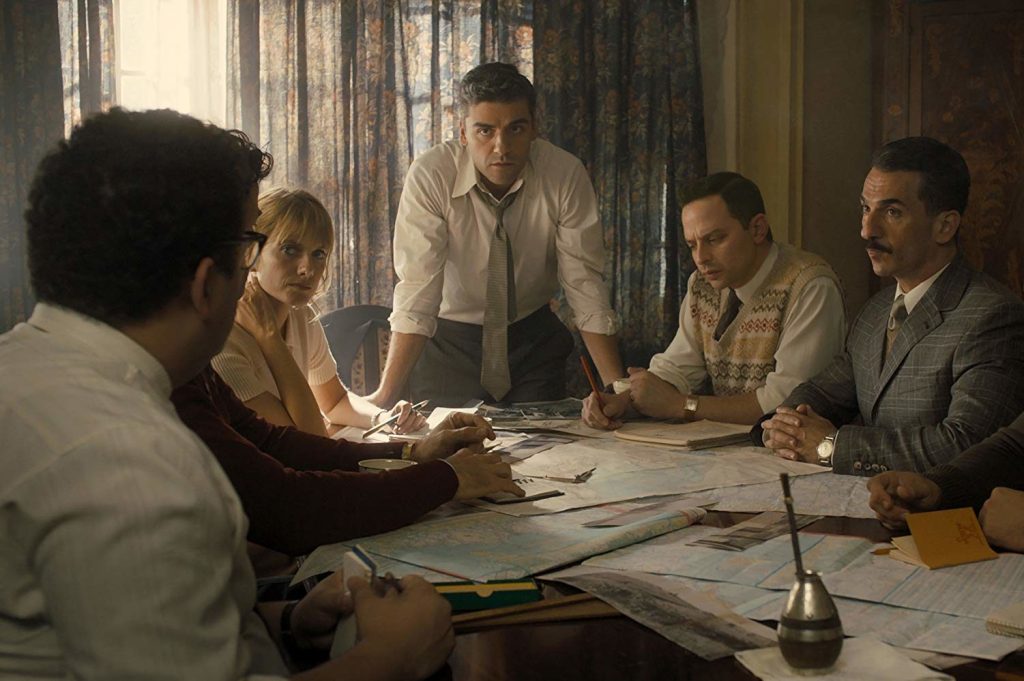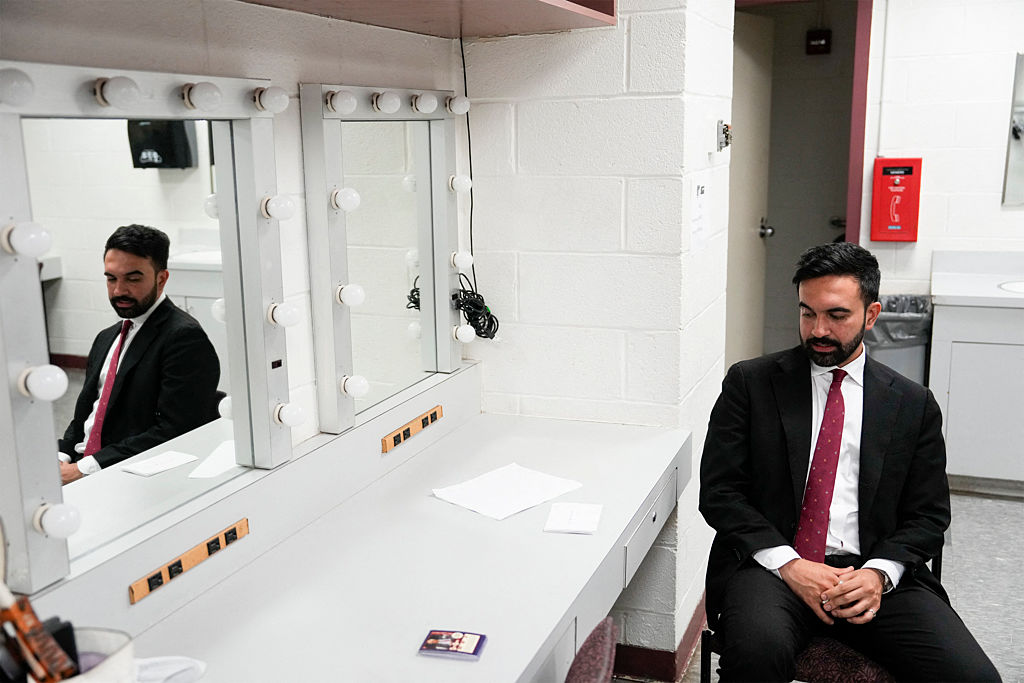They don’t make anti-Semites like they used to. Don’t get me wrong; I’m not complaining. But you’d think people who pride themselves on their metaphysical superiority would have more self-respect. Apart from the Nation of Islam, who remain true to the faith by dressing in the suit and bowtie of lower middle-class, small-town European Judenhass circa 1920, American anti-Semites are a sorry mess: a master race of of online mouth-breathers, hiding in their parents’ basements.
The Islamists, given their numbers and technological arsenals, are underachieving too. Hassan Nasrallah, the flower of the resistance, is afraid to come out in case the Jews drop a bomb on his sweaty head. And how tiny Ali Khamenei and Mahmoud Ahmadinijad must feel, and how petty the achievements of al-Qaeda and the Sunni Islamists and Arab nationalists look, when compared to the labours of Adolf Eichmann.
As head of the SS’s Office of Jewish Affairs, Eichmann was a big wheel in the machinery of genocide: aide to Heydrich at the Wannsee Conference, and logistical engineer of the erasure of the Jews from Europe. He worked around the clock to ensure that the trains going east ran on time, and he worked at the details with the commitment and care of the true believer. He even learnt Hebrew and visited Palestine — more than can be said about the majority of American Jews today.
Eichmann was the model of a modern mass-murderer, assembling a bureaucratic mountain of evidence for his guilt, with ink on his hands. At the end of the war, an Austrian Nazi bishop — a trifecta of old-school Jew-hatred — helped Eichmann to escape a noose at Nuremberg. He fled to fascist-friendly Argentina, where he was joined by his family, and took a job in a car plant — Mercedes, naturally — under the name ‘Ricardo Klement’. In 1960, the Mossad nabbed him and flew him to Israel for trial. Chris Weitz’s Operation Finale tells this story as a procedural conducted over a moral abyss. This is apposite, given the subject matter, but it gets a little hollow at times.
In 1956, Lothar Hermann, a half-Jewish German refugee, discovers that his daughter Sylvia was dating Eichmann’s son Klaus. Lothar, like any other concerned parent, writes to Fritz Bauer, district attorney of the West German state of Hessen. Bauer tells the Mossad, and Mossad director Isser Harel (Lior Raz) puts together a team. Peter Malkin (Oscar Isaac), the agent who wore gloves when he grabbed Eichmann so he wouldn’t have to touch him, carries two sub-plots. One is the memory of his sister Fruma and her children, murdered in Poland. The other is a failed romance with Hanna Elian (Mélanie Laurent), the team’s medic, whose job will be to keep Eichmann half-sedated as they smuggle him onto an El Al plane, dressed as an El Al pilot.
As in 1960, the team performance in Operation Finale is generally solid, but with unforeseen problems. At times, Operation Finale falls short of the 1979 TV movie The House on Garibaldi Street, with Topol in the Peter Malkin role and Alfred Burke as Eichmann. The romance between Malkin and Laurent never gets off the ground, and anyone who’s seen Lior Raz at full tilt in Fauda will feel he has been badly underused here. Simon Russell Beale, giving a cameo as David Ben Gurion, lays it on thick in a bad wig. The flashback scenes of mass killings in Polish forests might be necessary, to remind us what Eichmann’s bureaucratic defense actually meant, but they feel sentimental, especially in comparison to documentary footage from the camps, played at Eichmann’s trial.
Still, Oscar Isaac manages to present a case study in the ambivalence of revenge. The film, inevitably, belongs to Ben Kingsley as Eichmann. Kingsley relishes our attention, and Weitz is wise enough to keep the camera on him. Slowly, Kingsley exposes Eichmann’s lies and manipulations, and the impenitent vanity that compelled him to boast of his crimes — at the time of his kidnapping, he was taping his reminiscences for his memoirs. The final sequences, heightened by some familiar but well-handled devices, are tense enough, and in the end the whole contraption lumbers into the air just in time, to land in the courtroom in Jerusalem. That said, if you’re an anti-Semite, you’ll enjoy Operation Finale more if you wait for the DVD and then watch it in reverse.
Three elements elevate a B-movie script into an A-minus movie. Kingsley is one, and Isaac, an actor who deserves to be in better films, is another. The third is the pleasure of the analogue procedural. Orders are typewritten, cigarettes are smoked, ties are knotted, passports forged by hand, and Eichmann is identified not by DNA, but by the shape of his ear. We get a sense too of how audacious the Israeli plan was. El Al had no scheduled services to Argentina, so a flight was pegged to Argentina’s independence celebrations. No cell phones and satellite surveillance, either.
Eichmann was as guilty as sin. In retrospect, it’s surprising that no one else wanted to try him. The West Germans didn’t want to know; in the dock, he might incriminate former colleagues like Hans Globke, a co-author of the Nuremberg laws who became a national security advisor to the West German government. The CIA, preoccupied with the Cold War, didn’t want extra trouble in South America. The Israelis were more preoccupied with pre-empting another genocide than avenging the last one. They might have hoped to lay the past to rest as the title Operation Finale suggests, but instead the Eichmann trial, televised in Israel and across the West, became the moment at which the repressed memory of the Holocaust started to surface, and not just for the Jews.
Another story began in the courtroom. Unfortunately, Hannah Arendt was the first person to tell it. This week’s New Yorker calls Operation Finale a ‘valuable corrective’ to Arendt’s Eichmann in Jerusalem (1963), which collected her New Yorker essays on the Eichmann trials. Unfortunately, the New Yorker insists that Eichmann in Jerusalem remains ‘a crucial work of history’. It isn’t. Arendt treated her material sloppily, and though her ‘banality of evil’ concept might have its uses when we consider the complicity of ordinary people in extraordinary crimes, it doesn’t apply at all to Eichmann.
Before the war, Arendt had fallen for Heidegger, that devious Nazi, in grad school. After the war, she helped launder Heidegger’s reputation. In Jerusalem, she fell for the claims of another devious Nazi. Ignoring testimonies and Eichmann’s own confession, Arendt decided that Eichmann was incapable of ‘thinking’ in the moral sense — a plea of diminished responsibility by moral incapacity. Bettina Stangneth’s Eichmann Before Jerusalem (2010), in which Eichmann convicts himself out of his own mouth on his autobiographical tapes, proved that Eichmann too was a true believer, a high-grade anti-Semite who saw genocide as a mechanism for the metaphysical redemption of the Germans. The publication of Heidegger’s Black Notebooks (2014) proved that Heidegger was not just an opportunist, but a philosophically committed Nazi.
Given all this, it’s a mystery why anyone takes Eichmann in Jerusalem seriously — or why Arendt remains on the syllabus in American universities. After watching Operation Finale, you could worse than watch Margaret von Trotta’s Hannah Arendt (2012), an account of the Eichmann in Jerusalem controversy which inadvertently demonstrates that Arendt promoted the stupid idea of Eichmann’s innocence because she was an intellectual, and thus susceptible to airy idealising and puffballs of conceit. Operation Finale may have its flaws, but this fictionalised thriller is rooted enough in the facts to expose the banality of Hannah Arendt.

























